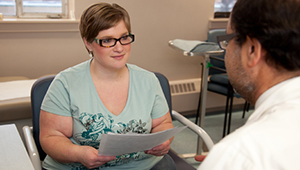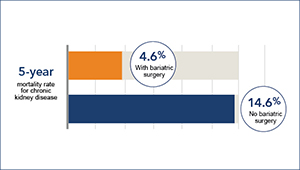Obesity
Research overview
“Obesity is the number-one health problem in the United States because it negatively affects our population’s health more than any other condition,” said Kaiser Permanente Washington Health Research Institute Senior Investigator David Arterburn, MD, MPH. Kaiser Permanente Washington researchers are doing practical research to learn how doctors, patients, families, employers, and policymakers can best work together to prevent and treat obesity.
“We’re focusing on three ways to halt the obesity epidemic,” said Senior Investigator Dori Rosenberg, PhD, MPH. “We’re helping to change obesity-promoting environments, bringing evidence-based prevention and treatment programs into health care systems, and helping people develop lifelong healthy diet and activity habits.”
Kaiser Permanente Washington obesity research areas include:
- reducing sedentary behavior and promoting physical activity and healthy diet in various age groups, populations with chronic conditions, and families;
- shared decision making to help patients find the best way to a healthy weight;
- implementing health coaches in primary care to support behavior changes;
- social networks that support lifestyle change programs;
- relationships between medications and genetic factors in developing obesity;
- health system, community, and national policies that address obesity;
- relationships between obesity and depression, diabetes, and other conditions; and
- long-term benefits and risks of bariatric (weight loss) surgery.
“Obesity is caused by many factors, so at Kaiser Permanente Washington, we’re working on many levels,” said Paula Lozano, MD, MPH, a senior investigator and Kaiser Permanente Washington’s assistant medical director for preventive care. “We’re improving health care to help people who are obese now. But since obesity is a societal problem, we’re also studying how to change our homes and workplaces and neighborhoods to create more healthy environments.”
Recent publications on Obesity
Simonson DC, Gourash WF, Arterburn DE, Hu B, Kashyap SR, Cummings DE, Patti ME, Courcoulas AP, Vernon AH, Jakicic JM, Kirschling S, Aminian A, Schauer PR, Kirwan JP Health-Related Quality of Life and Health Utility After Metabolic/Bariatric Surgery Versus Medical/Lifestyle Intervention in Individuals With Type 2 Diabetes and Obesity: The ARMMS-T2D Study 2025 Apr;48(4):537-545. doi: 10.2337/dc24-2046. Epub 2025-02-04. PubMed
Maciejewski ML, Zepel L, Smith VA, Arterburn DE, Theis MK, Baecker A, Sloan C, Clark AG, Kane RM, Daigle CR, Coleman KJ, Kawatkar AA Health Expenditures of Patients With Diabetes After Bariatric Surgery: Comparing Gastric Bypass and Sleeve Gastrectomy 2025 Mar;178(3):305-314. doi: 10.7326/ANNALS-24-00480. Epub 2025-01-28. PubMed
Arterburn D, Garcia R, Rosenberg D, Johnson E, Mettert K, Ng J, Brewer J Practical Awareness-Based Strategies for Eating (PASE): A Pilot and Feasibility Randomized Trial 2025 Feb;11(1):e70052. doi: 10.1002/osp4.70052. Epub 2025-02-12. PubMed
Bobb JF, Mooney SJ, Cruz M, Vernez Moudon A, Drewnowski A, Arterburn D, Cook AJ Distributed lag models for retrospective cohort data with application to a study of built environment and body weight 2025 Jan 7;81(1). doi: 10.1093/biomtc/ujae166. PubMed
Benz L, Mukherjee R, Wang R, Arterburn D, Fischer H, Lee C, Shortreed SM, Haneuse S Adjusting for Selection Bias Due to Missing Eligibility Criteria in Emulated Target Trials 2024 Dec 26 doi: 10.1093/aje/kwae471. Epub 2024-12-26. PubMed
Researchers in Obesity
 David E. Arterburn, MD, MPHSenior Investigator |
 Allen Cheadle, PhDSenior Investigator, KPWHRI; Senior Research Associate, CCHE |
 Andrea J. Cook, PhDSenior Biostatistics Investigator |
 Maricela Cruz, PhDAssociate Biostatistics Investigator |
 Nicole M. Gatto, PhD, MPHPrincipal Collaborative Scientist |
 Beverly B. Green, MD, MPHSenior Investigator |
 Mikael Anne Greenwood-Hickman, MPHSenior Collaborative Scientist |
 Paula Lozano, MD, MPHSenior Investigator; Director, ACT Center |
 Dori E. Rosenberg, PhD, MPHSenior Investigator |
 Gregory E. Simon, MD, MPHSenior Investigator |











